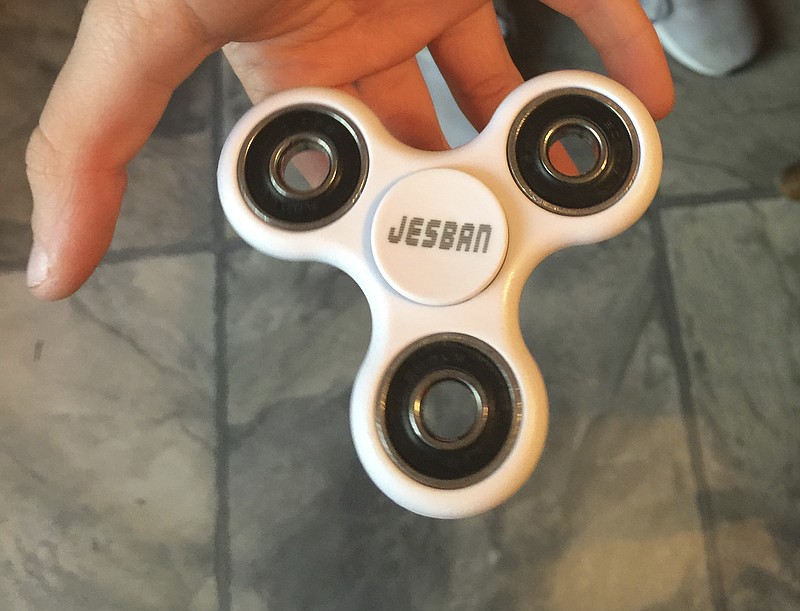View other columns by Mark Kennedy
"Spinning your wheels" is a cliche for good reason. It means trying hard at something but getting no traction.
In America's elementary schools, however, spinning your wheel is - inexplicably - a new pastime. It involves a small device called a "fidget spinner."
If you don't have a kid under age 12, you're excused for being in the dark. I asked a group of young adults if fidget spinners were "a thing" in their world and got back only blank stares.
Imagine a little propeller blade, the circumference of a small orange, that spins on a bearing. Beginners grip the fidget between a thumb and forefinger and then twirl it with the other hand. Give it a stiff launch, and it will spin for up to two minutes.
Supposedly, it helps kids with concentration problems to focus, although this claim seems dubious to me. In my experience, a fidget spinner has the opposite effect. Like a hypnotist's "shiny object" - it demands your attention, as you sit slack-jawed watching the propeller whir between your fingertips.
At any rate, our 10-year-old son came home from school recently telling us about this miracle toy that he so coveted. Funny how peer pressure works. If he had happened upon a fidget spinner in a toy store, I doubt that he would have given it a second look.
In typical little-boy fashion, he didn't just want one fidget; he yearned for "many fidgets." This earned my swift rebuke: "Uh-uh. No way."
Then one day, while visiting his aunt, they conspired to find a fidget spinner sale online, offering bulk sales for about a dollar per unit. They ordered a handful of spinners and started the countdown to delivery.
About a week later, we got a note from Amazon that the supplier had not shipped the goods and might not even exist. It was a good lesson in "you get what you pay for." Our son demanded compensation, but I decided litigation over a $5 order was probably not going to be cost effective.
Like any good negotiator, our son used his disappointment as leverage. One night as I was about to drift off to sleep, he asked me if he could order a fidget spinner variety pack for $35, using money he had saved.
"Sure," I said, not really knowing what I was agreeing to.
This meant that every conversation between my son and me for the next week would begin with the question: "Did my spinners get here today?"
During this four-day span, it occurred to me that the anticipation of ordering and receiving was more exciting to my son than the spinners themselves.
On the day they arrived, our 10-year-old was tired and irritable. We gave him the package of 10 spinners and his mood changed immediately.
Within minutes, he had opened all 10 packages and spread out all 10 spinners on a tabletop.
"Hey, Daddy, come here a minute," he called from the other room. "I want to show you something."
With that I walked in, and all 10 spinners were going 100 miles per hour. I searched his face and noticed his eyes darting from spinner to spinner.
"So much for focusing his attention," I thought. "This is why he wanted 'many spinners.'"
Try as we might, we adults never really get it, do we?
Contact Mark Kennedy at mkennedy@timesfreepress.com or 423-757-6645.

